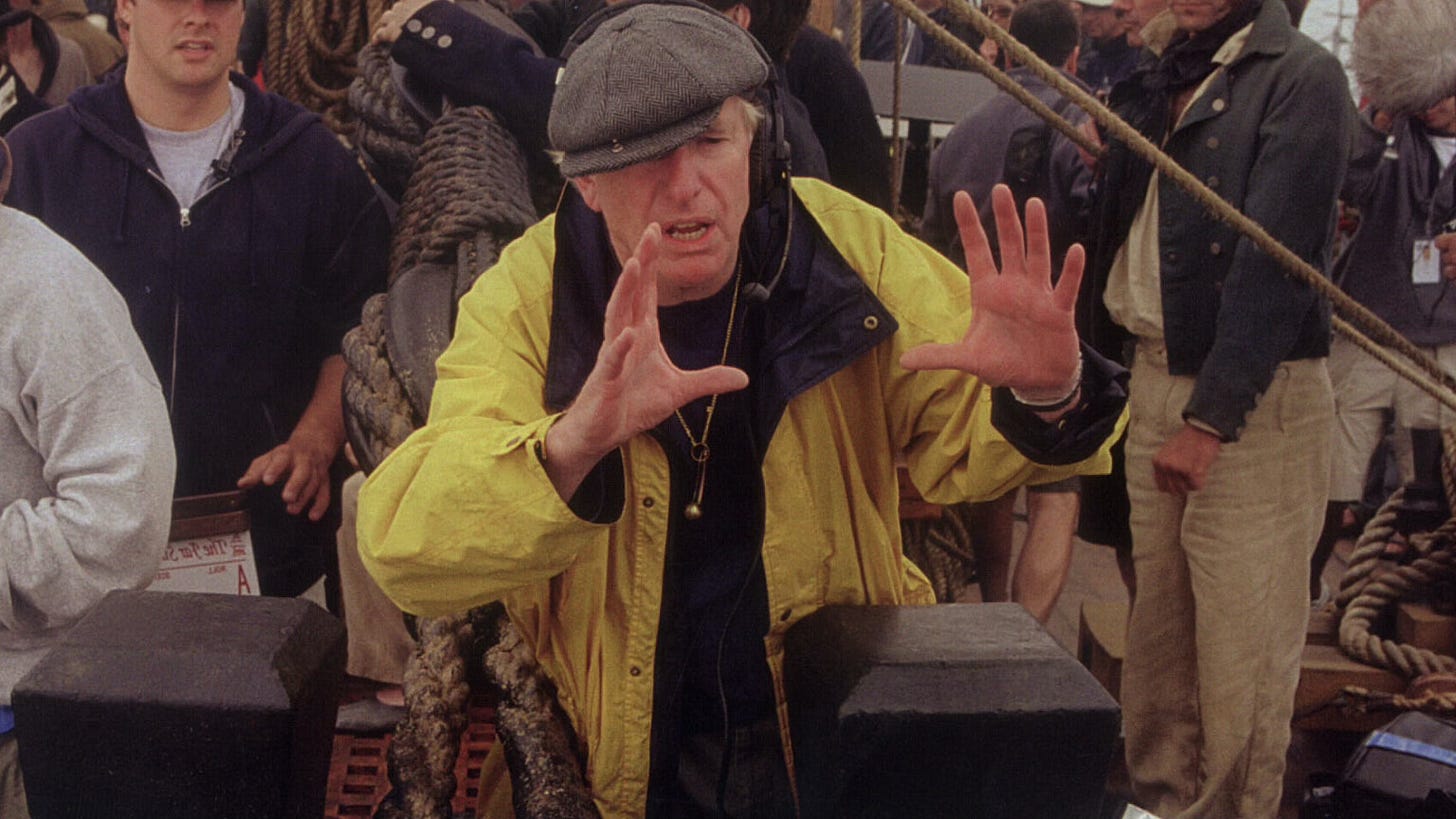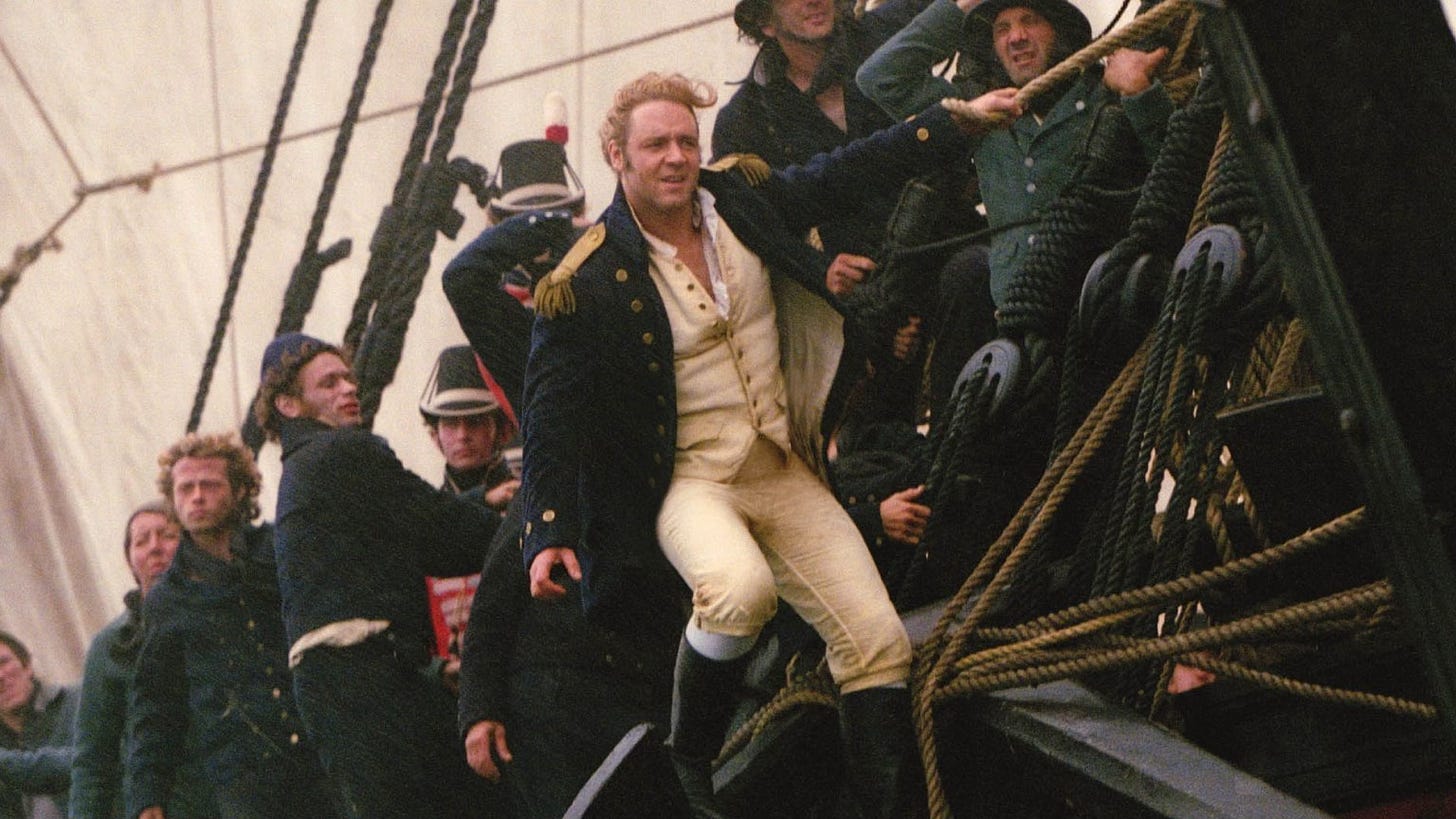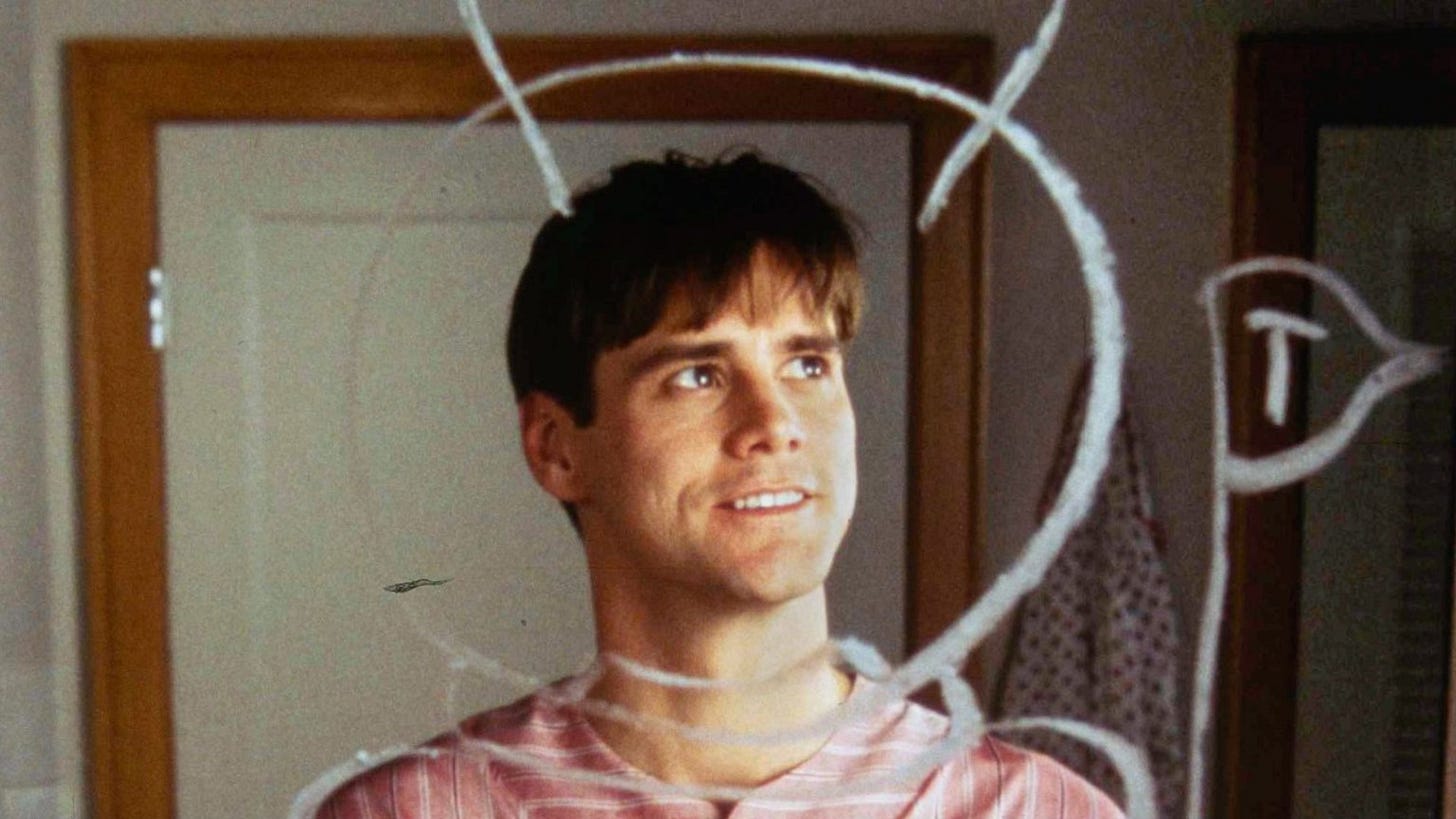The Retiring Peter Weir
Interviews with the great filmmaker from Master & Commander and The Truman Show
“For film directors, like volcanoes, there are three major stages: active, dormant and extinct. I think I’ve reached the latter!" Australian director Peter Weir told the Sydney Morning Herald in a career loopback in 2022 when he received an honorary Oscar. "Another generation is out there calling 'action' and 'cut' and good luck to them." In 2024, he made it final, saying at the Festival de la Cinémathèque in Paris, "I am retired. "Why did I stop cinema? Because, quite simply, I have no more energy."
The bounding energy of Weir's thirteen features is always ripe for appraisal, including 2003's Master and Commander: The Far Side of the World, recently revived by the Chicago Film Society on 35mm. Here's a conversation we had before its release, in Chicago in a luxury hotel lounge with wide windows looking to Lake Michigan, as well as an exchange about 1998's The Truman Show.
Whatever subject they explore, Peter Weir’s movies seethe with confidence.
Master and Commander: The Far Side of the World has a readymade audience of acolytes of Patrick O’Brian’s twenty seafaring novels that chart the friendship, follies and victories of Captain Jack Aubrey (Russell Crowe) and doctor Stephen Maturin (Paul Bettany). There could have been more, but instead, we have only this one. (David Mamet considers the late O’Brian one of the greatest novelists of the past thirty years.)
Others will savor Russell Crowe, masculine yet contemplative. Crowe plays Aubrey as a man of calculation and bluster, of confidence yet concerned for the safety of his crew and his ship.
Whether the haunting earlier work like Picnic at Hanging Rock, The Last Wave and Fearless, or popular successes like Dead Poets Society, Witness or The Truman Show, the sixty-one-year-old writer-director’s work is always an event.
Master and Commander is set in 1805, during the Napoleonic Wars. Most of Weir’s movie takes place onboard ship, teeming with sailors, men and boys alike, weaponry, ambition. When the crew alights in Galapagos, Weir’s wonderment shines: this is the strangeness that met explorers each turn of the way, a place as brilliantly colored and strikingly strange as the surface of another planet.
“O’Brien’s writing,” Weir says, “Mmmm. So full of wonderful images.” But much of Weir’s influence, both while working and in his movies, comes from music and sound. “There were paintings to be looked at. But for me, there were all sorts of other things. Music plays a primary role, at least at much as the visual, in settling into [a story]. For whatever reasons music seems to be suggestive of even more images for me. On occasions, I had tapes and CDs made up of music to listen to in the car, and different tracks will send me to different parts of the story. I think the music is important in the way that it inhibits the intellect and allows this more unconscious thought to come to mind.”
There’s a lot of nineteenth century sailor-speak in Master and Commander. “Well, that was a concern in early screenings with the studio,” Weir says, calmly, “that there were too many [terms of art] that were incomprehensible to the majority of people. I thought they were part of the atmosphere of reading the books. It is true, you do trip over them. But it lends an authenticity. My final point to any concerned executives was that if we were doing a medical story, we wouldn’t say, instead of ‘Pass that scalpel,’ ‘Pass that knife.’ It just doesn’t go that way! It helps you understand that you are entering a very foreign world. For O’Brien, he was not going to condescend to you. You had to join that ship like the landlubber you were.”
The movie’s opening reels are mesmerizing in their use of sound, easing an audience into this strange world. easing us in. “Exactly the plan. Generally speaking, [old movies set on the sea had] a very big score. When the sails went up, the music went up, when the sea was wild, y’know, the orchestra came in with a complementary feeling. But I wanted you to get to know the sounds. My experience of traveling [on a ship is] is that there was always sound, there everything was moving and rubbing and creaking and grinding or falling. I wanted the audience to have those sounds in their ears.”
Another memorable sound is Crowe’s grumbly voice, which dialect coaches suggested should essentially be his own Australian accent. Crowe’s kind of a throwback, offering lessons in swagger. “If overt masculinity is a throwback, possibly yes to that. There are very few [actors who suited the role] and considering the casting, there was Russell and, y’know, there was Russell. I think he’s strongly male. And in a period picture, it can be demonstrated in a way that masculinity was in that period. I think it’s very attractive to people.”
Weir had turned the project down. “I said to the studio, when turning it down the second time, ‘Look, I love the series. But I would prefer one of the books toward the middle of the series, where it’s a long voyage.’ And they rightly said, ‘What about the friendship? In book one, you see them meet.’ And I said, ‘Well, why not go on a mission and learn they’re friends during the course of that mission?’ But I felt since this genre, as they say, was being reawakened, you had to do something fresh.”
Like most assured and gifted directors, Weir thrives on limitations, even on a $135 million project like this one. “I thought a very limited palette was the solution. Group of people on a ship, one landfall. At the same time, I thought that would remind the audience in some way of how space movies have appropriated the experience of these people who opened up exploration from the fifteenth century right through to the tail end of exploration in this period. That you would realize they set out into the unknown, the sea would become space. The vessel would be like a spacecraft. The chances of getting back, maybe fifty-fifty. It was a dangerous thing to do, and an adventure.”
Peter Weir is a director of a rare modesty and patience, taking his sweet time to craft such films as Witness and Dead Poets Society. The Australian filmmaker hadn't made a film since 1993's Fearless and was even willing to take an extra year before filming The Truman Show to wait for Jim Carrey to become available.
Weir first got Andrew Niccol's script in 1995. "It was exactly what I had been looking for, which was sort of terrifying," he says. "I had been reading so many bland scripts or remakes, courtroom dramas, domestic dramas of one kind or another. I kept bashing the people who were sending me these, 'Can't we find something else out there? Send me things that are not working, even, send me things you wouldn't normally send, broken scripts that might have a spark.' So Scott Rudin sent me Truman. At first, it was a be-careful-what-you-wish-for thing, because I thought, how in the hell would I do this? If I do do it, should I do it, it's too hard, it's too difficult, who could play it? It has to be a movie star. But Jim Carrey was interested, and he was a star. The guy who played Truman had to be a star, or else why would [the world] watch the show?"
Weir is also pragmatic about the place of a Truman Show in the marketplace. "You have to ask, how to sell it? With [the selling of] big Hollywood movies, everything's become so specific, it is a comedy, it is a special effects movie. And this film was all and none of them. It was an original, in other words."
Andrew Niccol's scripts for Gattaca and The Truman Show have reached toward lustrous fable. Even the names strain for myth: in Gattaca, his genetically inferior overachiever is Freeman. Truman Burbank, a "true man" invented by television, bears the surname of the California 'burb where much of television is committed. His screenplay offers us a man who discovers he is the star of a twenty-four-hour-a-day documentary soap opera that is the most-watched show in television worldwide. Everyone he's ever known and loved is... an actor. Weir's meticulous embodiment of the childish paranoid fantasy—is the whole world watching me?—is unsettling and sad, funny and touching.
"The tools of the director's trade really are available to best express the idea inherent in the screenplay. So I'm not one much for film theories. When I talk about film noir, it vaguely interests me. But I tend to like this film or that film and dislike the other," says Weir. "The psychological ominousness is more of a hallmark to me than the shadows."
The Truman Show blanches with the horror of sunlight, a false utopia where every corner is visible to the eye in a Florida resort called Seahaven that is as much soundstage as mall (or hell). "It's there to be observed. What this story needed was what I did. That was, to create a kind of suffocating paradise. It was the ultimate holiday resort and the image of the holiday resort has been shaped by the palm tree, the golden sands, sort of beautiful color of the water and so on.
"This was essential to what made people watch this show. I had to come up with 'The Truman Show.' In a sense, I had to go through the he process of inventing 'The Truman Show' [within the film] in order to have the logic in place for the movie, to be able to satisfactorily accept that people watched it. It was a way of life that never really existed. It's idealized.
"We used Saturday Evening Post covers as inspiration. It is terrifying to have studied this kind of thing and television commercials and sitcoms, y'know, to see a life as it's being pointed out, without shadows, no mystery, no subtext, none of the difficulties we face. Those difficulties that are faced are resolved."
Weir's films are also ones that you also want to hear again. There's sometimes a dead sound, one of emptiness, an unusual quality at certain moments, not dead silence, not room tone, but a sudden sensation of emptiness conveyed aurally. "That was exactly the intention in this particular case. I love sound, I love it, I adore it, be it music or sound effects in a film. Sometimes it's interesting when there's an overlap. In order to create a sense of this soundstage, it's something Truman had grown up with, of course you have to construct sound, so using the surround sound you can do so much more now that you're free of the mono track. There are certain sounds that our designer, Lee Smith, came up with, which were mostly artificially created, 'studio atmos,' a presence with a slightly eerie edge. A sense almost that it's hollow, y'know, which gives the word 'hollow' a lovely double meaning there, in the sense that the life he was leading is exactly that. We get into a great detail with it."
Weir is cheered by the idea that a movie as odd as "The Truman Show" can still be made, but he's not entirely optimistic. "The craft of filmmaking is in danger of disappearing. Many films you see today are simply concepts vaguely realized with a lot of noise. It's rare to find a well-crafted film today. I'm not talking about pretty shots, but a really deep understanding of the film narrative."
Weir pauses. "Still, there's one way to put it all together."



